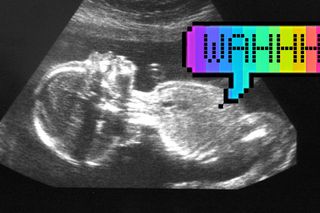
What I Learned About Babies and Dogs When I Googled ‘Do Babies Hear Like Dogs?’
Babies cry in utero, and other facts you didn’t realize you wanted to know.

The other day I was babysitting my 1.5-year-old nephew when I realized he was noticing something I was completely unaware of. At first I assumed it was a ghost, because if growing up in the 90s taught me anything, it’s that children can see dead people. But since I couldn’t find any ectoplasmic residue (a life lesson courtesy of the 80s) I considered other options. What if my nephew wasn’t seeing things I couldn’t see, but hearing things I couldn’t hear? Some animals, like dogs, hear frequencies that humans can’t perceive; maybe kids did, too. I promptly gave him a plastic bag to play with, kicked my feet up, and fell down the deep, dark rabbit hole of Google.
“Do babies hear like dogs?” I Googled.
Perhaps not the best-worded search, but it led me to arguably more fascinating and disturbing information. The first result informed me that dogs can hear babies cry in the womb, before the babies are even born. (Source: anecdotes on pet-owner forums, so you know — rock solid evidence.) Still, it begged the question:
“Wait, babies can cry in the womb?!?!” I questioned/screamed at Google.
Google: Yes.
“That seems needlessly dramatic why are babies crying before they’re even born?”
Google is fast, but I am faster. In the split second before algorithms answer my question, I develop the following theories:
- the mother-to-be is flying, and the yet-to-be-born baby’s ears popped
- the mother-to-be is flying and an already-born baby is crying and the yet-to-be-born baby feels left out
- the mother-to-be is flying and an already-born baby is crying, and so is the mother-to-be because crying babies on flights are the worst (#theycanthelpit #theparentsaredoingeverythingtheycan), and so the yet-to-be-born baby is crying in solidarity with its mom and also because it feels left out
I literally can’t think of any other answer that makes sense, but Google has one: “New research shows that fetuses may learn to express their displeasure by crying silently while still in the womb as early as in the 28th week of pregnancy.” (Source: legitimate health information portal.)
This is profoundly depressing. What could a fetus feel displeasure about? (Other than its twin stealing it’s clearly labeled lunch from the amniotic fridge.) I turn to Google, because I don’t want to step on anyone’s unborn toes and I honestly think this is out of Emily Post’s league.
“What would displease a fetus?”
Google leads me to a questionably sourced article on a generic parenting portal that I immediately take as truth:
- Hunger (inexplicable; babies are attached to a 24/7 feeding tube)
- Fatigue (totally valid; I cry when I’m tired, too; it embarrasses my husband)
- Fear (I get it; lunch-stealing twins are scary)
- “just to let you know that she needs to be hugged” (Of course; nature’s way of giving pregnant women practice at feeling like they’re failing their child)
There must be a way to outsmart nature.
“How to hug a fetus?” I ask Google.
Google: “……… how to hug a baby?”
Me: “Sure”
Google tosses back several results, the most interesting of which is a 2017 study that has found hugs in the earliest moments of life can help boost newborn’s brain responses. Which begs the question: What other brain responses do babies have that we’re unaware of? Might their little brains respond to things we can’t see and things we can’t hear?
“Can babies hear things adults can’t?”
Google: Yes.
More specifically, kids under 18 (some accounts say 25) are more sensitive to sounds adults are unlikely to pick up on. I take a Buzzfeed quiz that helps me understand how my hearing might be different from my nephew’s. I listen to the control pitch — check, I can hear it. But I can also hear the tone at 14,400 hertz, a pitch the quiz says is difficult for people over 25 to hear. I look forward to going home and drawing my husband’s attention to my nubile, 20-something ears. But that still does not answer my question. I try listening to the final pitch in Buzzfeed’s 100% scientific quiz and —
BINGO!
There it is. I cannot hear the pitch at 17,400 hertz, a sound Buzzfeed says “is often used to drive teenagers away.” Or confuse adult aunts.
Relieved that I finally have my answer — my nephew can indeed hear things I can’t, SO REASSURING — I close that tab. And my eyes land on one more search result a la Google: From a highly regarded science publication, “What Little Babies See That You No Longer Can.” Because my nephew was totally entertained and 100% safe playing with his plastic bag, I clicked on the article. Idle curiosity.
Babies can immediately pick up on minute differences in near-identical images that adults would have to look closely at two or three times to perceive. They lose this ability around 5 months, when they develop an ability known as perceptual constancy, that is, “the mechanism that allows you to recognize an object as being the same in different environments, and under very diverse lighting conditions.”
But the ability to see dead people? That lasts until at least age 9.
Liesl Goecker is The Swaddle's managing editor.
Related


Is There Any Way to Avoid A Repeat UTI Infection?
